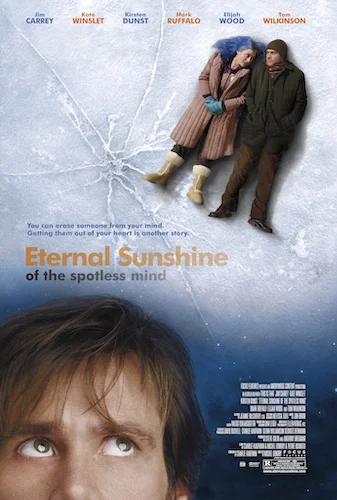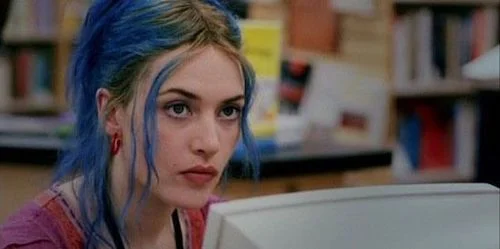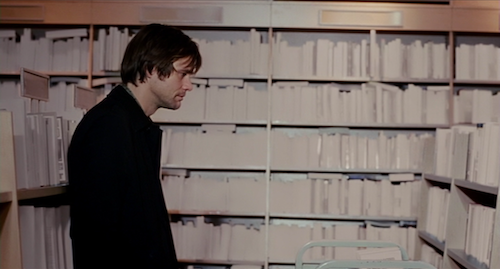Eternal Sunshine of the Spotless Mind: On-This-Day Thursday Review
Every Thursday, an older film released on this opening weekend years ago will be reviewed. They can be classics, or simply popular films that happened to be released to the world on the same date.
For March 20th, we are going to have a look at Eternal Sunshine of the Spotless Mind.
Charlie Kaufman strives to understand the human mind in all of his screenplays, yet he might understand it a bit too well. In this day and age, you may not find a finer screenwriter; he truly is a surgeon that dissects all of the quirks that we think are unique to ourselves, but are actually in everyone. Kaufman is secretly a rom com author that is caked in existential crises, and psychological magic. The walls of the brain are a labyrinth; how can you escape the maze that is you?
Michel Gondry is a student of film that vows to evolve the medium while resorting to its earliest charms. Like Georges Mélliès a century before, Gondry adores using film to betray your brain. You see stuff before your very eyes; it has to be real. Gondry favours practical effects, so his imaginative worlds feel all the more graspable.
Both Kaufman and Gondry are obsessed by the imperfections of our brains, and the drives of our hearts. When our thoughts crumble, we get lonely because our forgotten hearts are weakened by neglect. We need the will to continue when our head director is missing in action. Rather than showing the dysfunctional nature of these two aspects of us, this pair of cinematic dreamers yearn to show their dependency on each other.
A memory featuring Joel and Clementine.
Eternal Sunshine of the Spotless Mind is a generation defining film that exposes guilts we have all had. These can be bashful events (we just ran into someone, and now we have a major crush on them), or the evil thoughts that come after (I've spent an eternity with so-and-so. How did I ever have a crush on them?). Love is both a chemical reaction in the brain, and a willingness to identify it otherwise; we ended up blaming the heart instead, for instance. In Eternal Sunshine, we see the brain as the blame, but the heart is forever cursed. Memories are the damnation of a failed relationship, but the butterflies from deep within are inescapable.
In a distant parallel dimension, Lacuna, Inc. exists: an organization that offers the erasing of all of the memories of one person. Professionals stay with your unconscious body overnight, and delete thoughts one by one (as if they were freeing up space on your hard drive). Joel Barish feels depressed because he lost Clementine (the love of his life). Rather than clinging on to the moments that were good, he vows to eliminate her existence entirely. Philosophically, if you do not meet someone or have any thoughts of them in any way, they technically do not exist to you. Lacuna doesn't know it, but they are responsible for something much more damning than the erasure of recollections: they are endorsing the death of people in the minds of willing, exploited participants.
We see Joel's memories getting wiped out in reverse chronological order; this might be one of the cleverest uses of "flashbacks" in cinematic history (I dare you to find ten greater examples that would push this film out of the top list). Kaufman knows the pains of writing a screenplay, including how exposition needs to be displayed, and how we find out more about characters so they have depth. Here, the very premise eliminates any concerns of missing either element. We start off seeing why the relationship was sour, and we slowly see it turn into the heightened romance it once was.
Kate Winslet as Clementine.
Joel begins his experiment bitterly: how dare he have to face Clementine even once more. As more memories disappear, only the sweeter moments remain. At this point, it's a challenge to hang on to what is left. Is Joel's mind only happy now that the bad memories are gone? Is it still aware of the negative times until the very end of the cleanse? Either way, Joel finds happiness with Clementine; just like in real life, it won't be for long (although this time, it's because of the mind-wiping, and not a series of tampering events).
We have all had bad relationships. Sometimes, the bad ones came out of the best ones. Eternal Sunshine is not an answer of where it all goes wrong, but a reassurance that it may just go wrong beyond our control. In the latter example's case, we enjoy it while it lasts. Eternal Sunshine features additional hearts that break. Clementine is unsure why she suddenly hates Patrick. Mary is conflicted about her boss. For once, gut feelings have a clearly defined reason in a film. We see the reasons for these hunches. We are treated seriously.
Between the carefully laid out storyline, and the breathtaking performances (a hyper-real Jim Carrey, and a magnetic Kate Winslet for starters), we have the great visual entendre of Gondry's wizardry: the cinematic lens playing tricks on your mind like a confused heart would. Objects disappear. Faces warp. Scenery collapses in on itself. Eternal Sunshine secretly becomes a disaster film once the race to save the remaining memories begins. It's a clever depiction of the titanic weight a heart feels, and the panicking mind willing to save it in its final seconds.
Joel trapped in his own mind with a series of bare books.
All of the moments in Joel's subconscious feel like a dream. This is a spectacle, but it's clearly tangible. How much can a saddened human go through before the mind spirals into itself? In this film, we go there very quickly. No waiting. No unnecessary rushing, either. We discover the majority of this relationship's history from within the surreal world Gondry has woven for us. Proportions are off. Ages shoot around. We even get to know a bit too much about Joel, but at this point he would do anything to save Clementine from disappearing from him forever. It's awkward, but even in this imaginary landscape, it is so, so real.
This may take place in a fictional world, but it is every bit as relevant to ours as you can imagine. We throw away possessions, burn photographs, and delete ones and zeros on social media. The memory remains. This is the ultimate question: is that final step worth it when it comes to a normal relationship that just didn't work out?
A surreal memory Joel invites Clementine into, breaking the barricades of his mind.
The biggest achievement Eternal Sunshine accomplishes, is making a complicated concept accessible to just about anybody. Some filmmakers may have tried too hard, and the film would suffer as unidentifiable. Others would not jump all in, and the experiment would be lazy. Both Kaufman and Gondry have the perfect harmony between relatability and the great unknown. We know this entire film exists in all of us, but we've never reached this mindset before.
Love is not an easy ideology to describe, but it makes for one great challenge with endless possibilities. Eternal Sunshine is one of the finest in film history. City Lights channeled the purest of human emotions, stripped down to its core. Annie Hall is a frenzy to collect all of the pieces to explain why a love failed. Brief Encounter is the capturing of a fleeting moment. Casablanca is the gravity of what love truly is, and the sacrifices that take precedent over our own selves. Eternal Sunshine is a reinvention of both grief and celebration. Even if you don't have brightly coloured hair, or access to memory erasing equipment, Eternal Sunshine of the Spotless Mind is the catharsis about you (and all of us) that has united us all in our most vulnerable (and supposedly unique) times.
Andreas Babiolakis has a Masters degree in Film and Photography Preservation and Collections management from Ryerson University, as well as a Bachelors degree in Cinema Studies from York University. His favourite times of year are the Criterion Collection flash sales and the annual Toronto International Film Festival.









